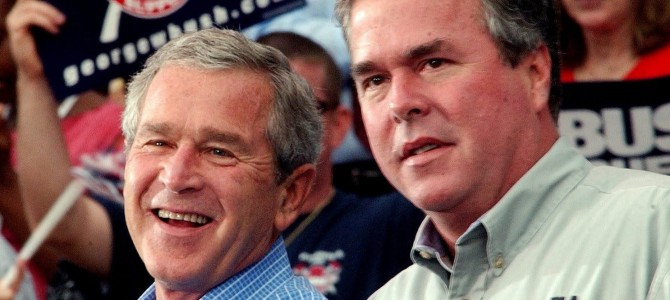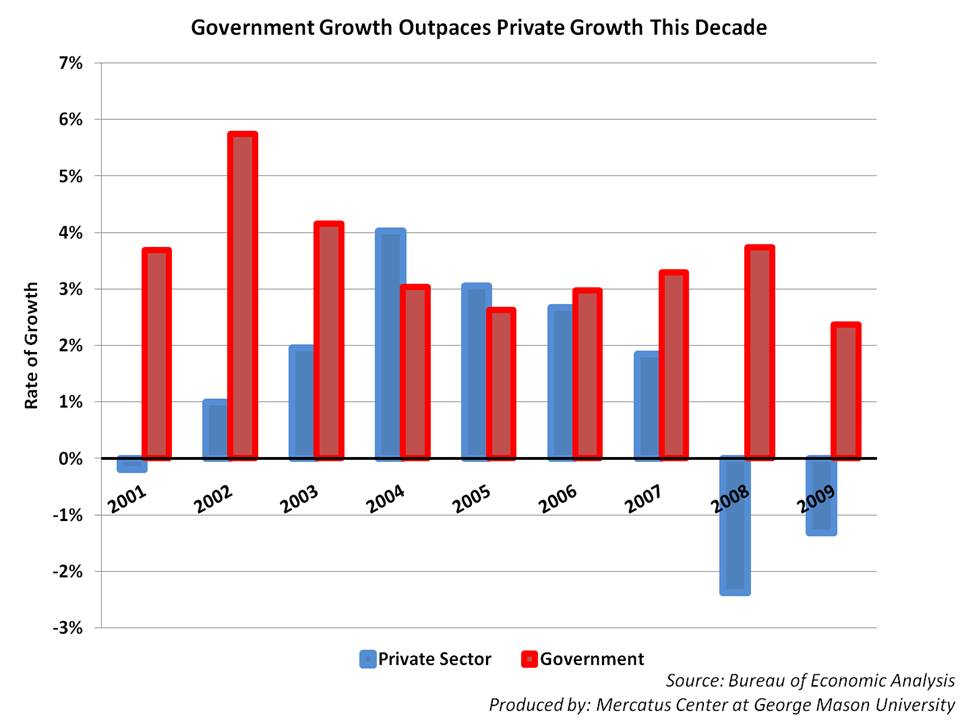
You don’t have to read deeply into Ron Fournier’s piece on the pending candidacy of Jeb Bush before running into one of the most preposterous strawmen in contemporary political discourse: “The answer isn’t no government,” Jeb theorizes. “The answer is smarter, effective government.”
What question is Bush answering, exactly? Is someone in GOP campaigning on the “no government” platform? As far as I can tell, no Republican in decades has argued for “ineffective” government—not even our libertarian-leaning friend from Kentucky. Those ham-fisted, ultra-conservative House members are many things, but anarchist is not one of them. This brand of false choice typically comes from Democrats who believe spending $3.9 trillion on a budget is austerity. And now Jeb Bush.
The fact that Bush feels compelled to frame the conservative debate in this way during his coming-out party at the Detroit Economic Club tells us plenty about his outlook. And that outlook grabbed some positive coverage from journalists who measure government’s morality by the number of laws it passes. Only a few paragraphs after Bush’s “no government” bromide hits readers, Fournier offers us this exchange:
I ask Bush why he’s seems to be avoiding the tropes of modern political debate: small government versus big government and tax cuts versus spending increases. He grins, ‘Well, I think I used “liberal” a couple of times.’
So “small government vs. big government” is a trope, but “effective government” vs. “no government” indicates that Bush is prepared to engage in a serious debate about the future of the Republican Party. Our national media seems to agree. Others—journalists under the impression that half the country is a reactionary mob devoid of ideas or philosophy—were equally impressed by Jeb’s reasonableness.
Lots to quibble with in Jeb’s economic speech today, but he’s first Republican to articulate a vision that isn’t just pure anti-Obamaism.
— Ryan Lizza (@RyanLizza) February 4, 2015
A healthy helping of anti-Obamaism is a predictable pushback against the hard-left policies of the modern Democratic Party and the president. It’s not unique to see a minority party focus on the opposition in power. But you would have to willfully ignore the numerous conservative reform plans being thrown around to believe that Jeb Bush is the first Republican to focus on anything other than Obama. (You don’t have to look any further than Mike Lee’s piece here at The Federalist.)
So what did Bush offer, specifically? What can you quibble with? Not much. That’s the second problem. Jeb is still on a “journey,” you see. Not too early to pick a fight with economic libertarians, but way too early to get specific. What we learned, in Politico and elsewhere, is that Bush wants to show everyone that he’s not Mitt Romney. Jeb is compassionate. National Review reports that AEI’s Arthur Brooks had a kinder take. Bush was “positive and opportunity focused, without harshness or bitterness” and was “definitely sounding both conservative and reformist.”
People should avoid sounding harsh or bitter. That’s for sure. For me, though, Jeb sounded more like a compassionate conservative than a modern reformer. And I tend to be pretty bitter about this:
It’s becoming an article of faith among some conservatives that Republicans need to jump into the class-war pandering game to win the presidency. And Jeb, who sounds like he’s preparing for the 2016 campaign, is all in. “We have a record number of Americans on food stamps and living in poverty,” he explained. “The opportunity gap is the defining issue of our time. More Americans are stuck at their income levels than ever before. It’s very hard for people to go from the bottom rungs of the economy to the top. Or even to the middle. This should alarm you.”
The second half of this statement is arguable. Of course, focusing on ways to create more dynamism and opportunity is never a bad idea. But how many voters genuinely believe “the opportunity gap is the defining issue of our time?” Where is the evidence that “inequality” is a winning issue at all? Gallup, for example, finds that among the biggest worries Americans have is spending and the budget. Another one is size of federal government. As Cokie Roberts pointed out not long ago, Republicans have won more than 900 seats in state legislatures since Obama took the presidency—not to mention Congress. The thrust of the GOP’s message in most of those races was a promise to pull back government, not to allocate more “fairness.”
Or put it this way: how many voters who do believe “the opportunity gap is the defining issue of our time” are going to take a second look at Republicans because Bush is more pleasant to listen to than Romney?
No matter how many smart ideas conservatives have, contemporary American politics, at its core, is an argument about small government vs. big government and tax cuts vs. spending increases. It is this tension that animates large swaths of voters. How politicians approach these issues matter. It’s vital to offer fresh ideas to entice people to vote for your party. It’s important to come up with policies that help government run more efficiently. Presidential elections are, in large part, national referendums on a broader philosophical question regarding government’s role in our lives. Can anyone who believes in limited government trust Jeb Bush to make this argument in a compelling way?
It’s one speech. Perhaps Bush is the best candidate to bring the reformicon message to masses. You can defend his candidacy on the grounds that—unlike many of the other names being thrown around—he’s actually implemented statewide reforms on education and taxes. Mostly, his big speech will likely substantiate many of the misgivings conservatives already have about him.
“The challenge,” Bush says, “is how do we move to a 21st century government to deal with 21st century opportunities and challenges?” I think the challenge is getting past the platitudes of the late twentieth century. But that’s just me.










